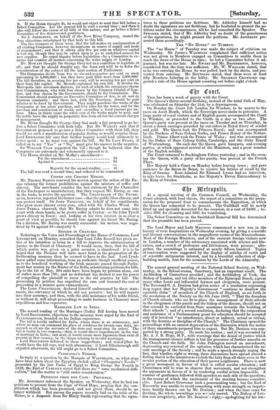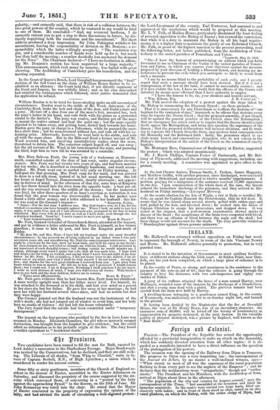ht 311ttrupulio.
At a special meeting of the Common Council, on Wednesday, the Court adopted, with loud cheers, the report of a committee on the prepa- ration for the proposed feast to commemorate the Exposition, at which the Queen has consented to be present. The Guildhall will be newly fitted up and specially decorated for the occasion, at a cost of 34001. ; be- sides 500/. for cleansing and 500/. for ventilating.
The Select Committee on the Smithfield Removal Bill has determined that the preamble has been proved.
The Lord Mayor and Lady Mayoress commenced a new rare in the history of civic hospitalities on Wednesday evening, by giving a scientific and literary conversazione in the magnificent rooms of the Mansionhouse. Most of the Foreign Ministers, and of the eminent foreign visitors now in London, a number of the aristocracy associated with science and lite- rature, and a crowd of professors and litterateurs, were present ; alto- gether, the assemblage is estimated at nearly fifteen hundred. Topics of conversation were suggested by the display of articles of vertu and of scientific antiquarian interest, and by a beautiful collection of ship- building models, lent for the occasion by the Lords of the Admiralty.
The annual general meeting of the National School Society, on Wed- nesday, in the School-rooms, Sanctuary, had an important result. The Archbishop of Canterbury presided ; and the Archbishop of York, the Bishop of London, and ten other members of the Episcopal Bench, a great many other Lords and influential laymen and clergymen, were present. The Reverend G. A. Denison had given notice of a resolution expressing deep regret that her Majesty's Government " continue to disallow the equitable claim" of members of the Church of England, as set forth in the resolution of the Society on the 6th June 1849, " That the founders of Church schools, who see fit to place the management of their schools in the clergymen of the parish and the bishop of the diocese, should not on that account be excluded from State assistance towards the building of their schools "; and of a second resolution, declaring that the cooperation and assistance of a Parliamentary grant for education should be accepted only if it involved "no interference, direct or indirect, actual or virtual, with the doctrine or discipline of the Church!' The Chairman opened the proceedings with an earnest deprecation of the discussion which the notice of these amendments prepared him to expect. But Mr. Denison was sup- ported by a strong party. He made his motion ; and it was seconded by Mr. A. J. B. Hope, M.P., with warnings that the denial of justice which the management-clauses inflicts is but the precursor of further assaults on the Church and the faith. Sir John Pakington moved an amendment, deprecating any renewal of the agitation which has characterized the re- cent meetings of the Society ; and he made a speech strongly urging the fact, that whether right or wrong, these discussions have spread abroad a feeling that it is the intention to exclude the laity from all share even in the secular portion of the education of their poorer neighbours. There is now a great movement in favour of what is called secular education ; and Churchmen will be wise to observe that movement, and not strengthen the arguments in favour of it by rendering cordial action impossible. A number of gentlemen followed with speeches on each side of the question; in the course of which the excitement of the meeting became consider- able. Lord Robert Grosvenor took a peacemaking tone ; but the Earl of Harrowby was unable to avoid remarking with some strength on imputa- tions hastily thrown out by Mr. Denison ; and when the time came for dividing, the whole assemblage was wa-mly moved. The Bishop of Lot- don rose irregularly, after Mr. Denison'l reply,—apologizing for his irre-
gularity,—and earnestly said, that there is risk of a collision between the two great powers of the country, which he -ventured to say would be fatal to one of them. He concluded—" And, my reverend brethren, I do earnestly entreat you to put a stop to these discussions in future, by dis- tinctly negativing both the resolution and the amendment." His short address produced a deep impression. Sir John Pakington withdrew his amendment, leaving the responsibility of division on Mr. Denison ; a re- sponsibility which the latter willingly accepted. " The resolution was put, and a considerable number of hands were held up for it, but much less than half the meeting ; a number decidedly less answered the demand for the Noes." The Chairman declared—" I have no hesitation in affirm- ing Mr. Denison's motion has been negatived by a large majority." This announcement, which took many by surprise was hailed with great cheering. The Archbishop of Canterbury gave his benediction, and the meeting separated.
In the Court of Queen's Bench, Lord Campbell has pronounced the "final" decision of the full Court on the claim of William Henry Barber to be re- admitted as an attorney : the Court held that, if not directly cognizant of the fraud and forgery, he was wilfully blind ; and as his own misconduct had entailed the consequences which followed, strict justice demanded that his application be refused.
William Burden is to be tried for horse-stealing under an odd succession of circumstances. Burden went to the stable of 11;. Wood, dairyman, of the Cambridge Road, broke the lock and chain of the door, and found a mare and a pony. He tore off a shoe from one of the mare's feet, mounted her, took the pony's halter in his hand, and rode forth with his prizes on a pretended errand to the farrier's. The pony was restive, and Burden got off the mare to mount the restive animal and lead the quiet one ; but the mare equally objected to be taken away, and getting loose, darted back towards her home. Burden gave the pony in charge to a Policeman, while he pursued the mare for a short time ; but he soon returned without her, and rode off with his re- maining prize. Afterwards, however, he went back to the stable, and rode off with the mare alone. But in the Mile-end Road a former servant of Mr. Wood accosted him, and receiving unsatisfactory replies about the mare, threatened to detain him. The conscious culprit leaped off, and ran away ; but the old servant of Mr. Wood in his turn mounted the mare, and pursuing the thief, kept him in view till he was arrested by a constable.
Mrs. Mary Rebecca Pratt, the young wife of a tradesman at Hammer- smith, committed suicide at the close of last week, under singular circum- stances. Mrs. Pratt was but twenty-two years of age, and had been married but ten weeks ; she is described as exceedingly handsome, and much accom- plished. Mr. Pratt went out to market very early on Friday morning. At half-past six that morning, Mrs. Pratt rang for her maid, and was assisted to dress in a red silk dress, instead of in her usual morning one. She left her house at Angel Terrace, Hammersmith, shortly afterwards ; not appear- ing in distress of mind. In the afternoon of that day, some boys at Kingston saw her throw herself into the river from the opposite bank : a boat put off; and she was recovered from the middle of the stream ; but the immersion was fatal, for after three-quarters of an hour's exertion at restoration it was found that the poor woman was irrecoverably dead. In her pocket were found a little silver money, and a letter addressed to her husband : this let-
ter was read at the Coroner's inquest—. " Kingston, Friday. " James—For the last time I address you. May God forgive you, as I do, for the wicked accusations you have brought against me. When I took an oath to you last night, it was quite true, and all I said afterwards a lie, prompted by the fear of being murdered. May every wife do her duty as well as I have done, even though she has a drunken husband. Good by! I never expect to meet you again.
" Your broken-hearted wife, MARY it. PRATT."
Mr. Nutt, licensed victualler of Gracechurch Street, attended at the inquest, and put in evidence a letter addressed by Mrs. Pratt to himself, as her former guardian ; it came to him by post, and bore the Kingston post-mark of Friday.
" My dear Mr. and Mrs. Nutt—I have left my husband under the most dreadful circumstances : he has accused me of being seduced by my father when I was only seventeen years old, and also allowing Mr. Nutt the satneimproper intercourse. Last night he seized me by the hair,. drew my head back, and held his razor to my throat; he then jumped on me, and tried to strangle me with his hands. I still persisted in My innocence of such dreadful crimes ; but feeling certain he would murder me, I owned, although every word I spoke was a lie, that all was quite true. I hope God will forgive me for being so wicked, and saying what I knew was not right of my dear father ..nd Mr. Nutt. I felt so helpless, I did not know what to do; indeed, I am al- most out of my mind, and what I shall do with myself I do not know. Accept my love, and thanks for the very great kindness I received from you. I got away from home whilst he was at market. Ile left me in bed, and I promised I would remain there ; but I could not. I am at Kingston. How/long I shall stay here I do not know. I write in such distress of mind, I hope you will excuse all errors. With kindest love to you both and the dear children, believe me to remain, " Yours most affectionately, MARY It. PRATT." Mr. Nutt gave evidence that he had known Mrs. Pratt from her childhood. A more worthy upright man than her father never lived. For himself, he was attached to the deceased as to his child, and had ever acted as a parent to her since she lost her father. He gave her away at her marriage ; he had seen her with her husband several times since, and had no notion but that they were happy.
The Coroner pointed out that the husband was not the instrument of the wife's death ; she had not jumped out of window to avoid him, and her body bore no marks of violence : she had left the house voluntarily.
The Jury found that the suicide had been committed under " temporary derangement."
The inquest on the four persons who perished by the fire in Love Lane was resumed on Monday. Elizabeth Chambers, the ro girl who so narrowly escaped destruction, was brought from the hospital to give evidence ; but she could afford no information as to the probable origin of the fire. The Jury found a verdict equivalent to " Accidental death."



























 Previous page
Previous page